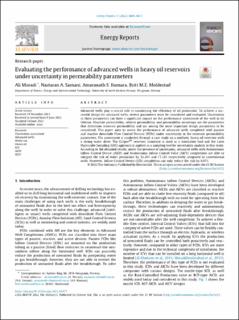Evaluating the performance of advanced wells in heavy oil reservoirs under uncertainty in permeability parameters
Moradi, Ali; Ahmadpour Samani, Nastaran; Wahumpurage, Amaranath Sena Kumara; Moldestad, Britt Margrethe Emilie
Peer reviewed, Journal article
Published version
Permanent lenke
https://hdl.handle.net/11250/3007806Utgivelsesdato
2022Metadata
Vis full innførselSamlinger
Originalversjon
Moradi, A., Samani, N. A., Kumara, A. S. & Moldestad, B. M. E. (2022). Evaluating the performance of advanced wells in heavy oil reservoirs under uncertainty in permeability parameters. Energy Reports, 8, 8605-8617. https://doi.org/10.1016/j.egyr.2022.06.077Sammendrag
Advanced wells play a crucial role in maximizing the efficiency of oil production. To achieve a successful design for advanced wells, several parameters must be considered and evaluated. Uncertainty in these parameters can have a significant impact on the performance assessment of the well in its lifetime. Absolute permeability, relative permeability, and permeability anisotropy are the parameters that determine reservoir permeability and are among the most important design parameters to be considered. This paper aims to assess the performance of advanced wells completed with passive and reactive downhole Flow Control Devices (FCDs) under uncertainty in the reservoir permeability parameters. The assessment is conducted through a case study on a synthetic heavy oil reservoir with a strong water drive. The EclipseSM reservoir simulator is used as a simulation tool and the Latin Hypercube Sampling (LHS) approach is applied as a sampling tool for uncertainty analysis in this study. According to the obtained results, under the presence of uncertainty, advanced wells with Autonomous Inflow Control Device (AICD) and Autonomous Inflow Control Valve (AICV) completions are able to mitigate the risk of water production by 53.20% and 71.12% respectively compared to conventional wells. However, Inflow Control Device (ICD) completion can only reduce the risk by 0.87%.

